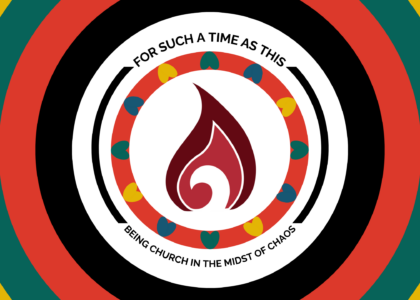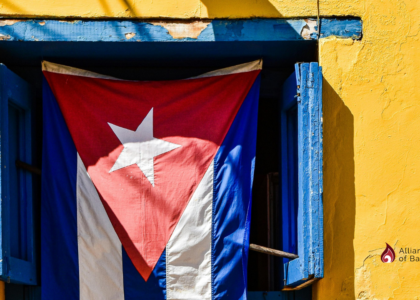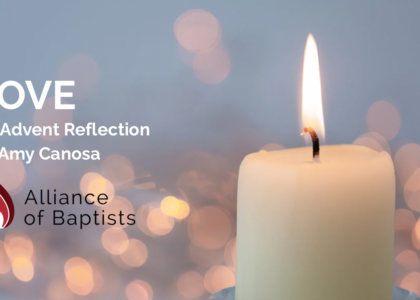By Kyndall Rae Rothaus
On August 26, National Women’s Equality Day, we commemorate the day in U.S. history when (white) women could finally vote.
As we already know, more than a hundred years later, women are still not equal. I could write about the gender wage gap. I could write about the under-representation of women CEOs, presidents, senators, etc. I could write about gender-based violence or the stripping away of a woman’s right to choose what she does with her own body. But that is hardly new information.
Since this is a Baptist publication, I could write about the Southern Baptist Convention and their recent ban on female pastors. I could write about the Baptist General Convention of Texas in my home state who took the word “pastoral” out of their affirmation of women, turning what was supposed to be a moment of support for our Baptist sisters into yet another moment of defeat and suppression.
Frankly, most of what I could write about—all of that—hits a little too far from home. We Alliance of Baptists types pride ourselves on being pro-women down to our roots.
I think what I want to write about instead is how I, as a woman, had the hardest job of my life when I worked as the senior pastor of a progressive Alliance church. Having women in leadership doesn’t mean we’ve achieved equality or eradicated discrimination.
And let us not fail to mention that National Women’s Equality Day is primarily a white woman holiday. August 26, 1920 didn’t open the same opportunities for women of color as it did for white women, and white suffragists and white feminists have repeatedly excluded women of color. Having white women in leadership doesn’t mean you’ve achieved equality or eradicated discrimination. Giving women the vote doesn’t mean women’s voices are being heard.
Allow me to give you a concrete example: I’ve been reflecting on a particular sexual harassment incident that occurred in my congregation while I was the senior pastor. To be totally honest with you, I am appalled by how little I really did to protect the woman and hold the perpetrator accountable. I, Kyndall, staunch feminist, stayed way too quiet and did not even realize until years later that I had stepped out of alignment with my own feminist values.
I own and regret that I got it wrong. I simultaneously offer myself grace, recognizing that when we call pastors to churches without a sexual harassment policy already in place we are placing a great burden upon a pastor’s shoulders, especially if she is a woman. I offer myself grace knowing that the system around me did not provide the support I needed to enforce accountability in that situation. I failed to do what was necessary, and I was disempowered by the system to take action. It’s both. The system failed me. I failed to crack the system.
I believe there is a seductive impulse in progressive settings to go wide, but not deep. After all, fighting for widespread change makes you feel like a hero. Digging deep into your own self and your context to learn what you’re doing wrong forces you to rub shoulders with feelings of failure.
I think the best way to describe my experience working at a “progressive” church was that I worked for a broken system full of mostly well-intentioned people who got it wrong a bunch of times in ways that hurt women and other folks who lacked power. I knew I was failing to crack the system, but I also knew it was likely impossible to crack it when too many people didn’t see or comprehend the system’s harm. Eventually I burned out so hard that I exited abruptly, simultaneously rescuing my mental health and well-being from deeper damage but likely destabilizing a congregation in the process.
Four years later I think what I have to offer by way of reflection is that the work in our local contexts must go deep, and too often in progressive settings we unwittingly settle for shallow. We passed an open and affirming statement? Look how inclusive we are! We hired a person of color to serve in senior leadership, so we’re definitely not racist. We’ve had female deacons since 1972; obviously we conquered sexism a while ago. In reality, we took some important steps, but those were just first steps. There’s still a whole marathon to run.
I believe there is a seductive impulse in progressive settings to go wide, but not deep. After all, fighting for widespread change makes you feel like a hero. Digging deep into your own self and your context to learn what you’re doing wrong forces you to rub shoulders with feelings of failure. Working for widespread change often means calling out people who exist far away from you, maybe even villainizing the people who disagree with your cause and feeling justified that you are on the right side of history. Going deep means calling out your best friend or the person you’ve been a deacon with for the last twenty-five years. It means hard conversations with the people you see every week and an uncomfortable examination of your own behaviors. It means admitting that the world isn’t made up of good guys and bad guys, just people who make better or worse decisions in response to the systems around them.
Despite how hard it is to go deep, I also think there’s a certain joy and satisfaction in it as well, because going deep can be achievable in a way that going wide isn’t always. What I mean is, we all know the world is a dumpster fire right now, and compared to the size of the problems I often feel helpless. I walk out my door every day into the 105 degree heat and am overwhelmed by how little I can do to change the course of climate change. I read the news about another school shooting, and I feel helpless to protect my two little kindergarteners as I watch backpacks that seem bigger than their bodies bobbing up and down as they skip carefree down the hallway to class and hopefully not to their deaths.
Don’t get me wrong. I will continue to work for widespread change because wide change is critical. We need a strategy for going wide. But especially in our local contexts—our congregations, our families, our seminaries, our organizations, our own souls—we need to go deep. If we’ve taken step one in our local context, it’s time to ask about steps two and three. If we’ve taken ten steps forward, it’s time to find steps eleven, twelve, and thirteen.
Besides, maybe depth change is the precursor to width change. My daughter finally learned how to swim without her floaties this summer. She can’t yet swim the length of the pool . . . but she can swim down to the bottom to retrieve a diving toy. If you prematurely try to go wide before you learn to go deep, it’s possible you’ll drown. You’ve got to become familiar with the depths of the work.
Here’s my invitation for National Women’s Equality Day this year: don’t take a surface approach. Pat yourself on the back if you want to because you hired your first female pastor in the 80s. But then ask yourself what comes next, because forty years of back patting is probably sufficient. It’s time to go deeper.
Sometimes I think back on my time as a pastor and wonder if I failed. After all, I couldn’t make the deep work happen, and so I left.
I know what my friend Amy would say: “It wasn’t you. It was the system.”
She’s right. And. Only people can change the system. Dr. Katie Lauve-Moon and I spent two years developing the UndoingSexism course for congregations because we know from experience it’s nearly impossible to do this work on the inside without help from the outside. I’ve spent six years running an annual conference (Nevertheless She Preached) where clergy and lay people of all genders gather to learn and be inspired to do the deep work. I wrote Thy Queendom Come and I work with individuals in spiritual direction because even though I left the church, I didn’t leave the work. I’ve made it my mission to help people and organizations do the deep dive successfully. I know what it is like both to fail and to be failed. You, my friend, are at risk of the same. But I say: dive anyway. Better to try than splash in the shallows and call it the ocean.

Rev. Kyndall Rae Rothaus (she/her) is an award-winning preacher, spoken word artist, feminist theologian, spiritual director, and preaching coach. She is the author of Thy Queendom Come: Breaking Free from Patriarchy to Save Your Soul (2021) and Preacher Breath (2015). She is the co-founder and Executive Director of Nevertheless She Preached, a national, ecumenical preaching conference designed to elevate the voices of folx on the margins.





Finally we are getting somewhere!
Thank you, Rev. Rathaus, for digging through the “stuff” that clogs our spiritual arteries as we work at soul freedom, for even us women.
Your words and advise ring true to my experience in the church and academy the past 50 years. Each of us Baptist women “has a story to tell.”
Similar experiences, yet you’ve expressed them ever-so-well! I am grateful to you.
This is powerful, Rev. Kyndall, and so needed! Thank you for writing this. I hope you also publish it in Baptist News Global and other publications.